WRONG TACTIC HSIEN LOONG! BY ‘EMULATING’ HIS ‘DURIAN’ PAL NAJIB, S’PORE PM ONLY SHOWS THE NASTY SIDE OF HIS REGIME BY CRACKING DOWN ON HIS 1MDB ACCUSERS – REPORT
Singapore Prime Minister Lee Hsien Loong suggested on Sunday a general election may be called next year. Calling a general election by 2019, more than a year before his government’s mandate ends in January 2021, means something is brewing for the premier who makes S$2.2 million (US$1.6 million; £1.2 million; RM6.7 million) a year.
While the world’s attention is on U.S.-China trade war, countries in the region such as Singapore are not immune to the spill over effect. As the country braces for growing economic uncertainty, PM Lee’s intention to call a snap election is to avoid potential risks. His PAP (People’s Action Party) has ruled Singapore since the republic’s independence in 1965.
Interestingly, Singapore gained its independence from Malaysia, the country that raised global eyebrows about 6 months ago when Barisan Nasional coalition government, also having ruled since the country’s independence in 1957, was kicked out of power in the May 9th general election this year. Although his PAP is unlikely to be overthrown, Mr. Lee has every reason to be concerned.
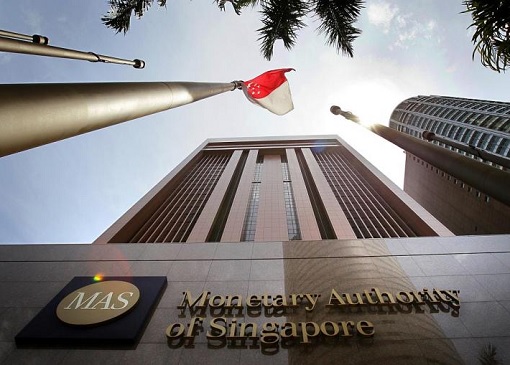
Already, Singapore’s central bank – MAS (Monetary Authority of Singapore) – has warned that an intensifying trade row between China and the United States is likely to hurt its economy. There were signs of voter discontent among Singaporeans, largely due to wealth disparity. PAP’s worst performance at the poll was in 2011 when 40% of voters turned against it, and it could happen again.
For the first time in 17 years, water prices were raised by 30% under Lee administration. The two phases price hike – first in July 2017 and the second effective July 2018 – affects some 900,000 households in the republic, although they were given some minor subsidies as sweetener. Electricity tariffs for the first 7 months this year alone have risen by a mind-boggling 16.8%.
Public transport fares, including bus and train, would go up by 4.3% starting Dec 29. But the hidden reason why Lee Hsien Loong wanted to call an early poll is none other than GST, scheduled to go up from 7% currently to 9% in the period between 2021 and 2025. The GST was last raised in 2007, when it went up from 5% to 7% – announced by Lee himself, then-Finance Minister.
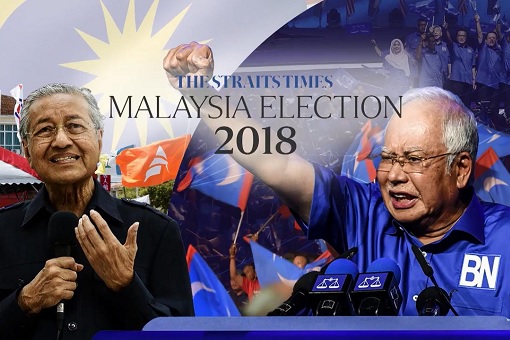
Somehow, the “good and services tax” has sent shivers down Lee’s spine, for a good reason. His buddy from across the causeway – Najib Razak – stunningly and unexpectedly lost his power as the Prime Minister of Malaysia in the May 9th poll largely due to GST. By hook or by crook, Mr. Lee has to call for an early election next year because to do so in 2020 would be too close for comfort.
Having seen what could happen to his good friend ex-premier Najib, the son of Singapore founder Lee Kuan Yew isn’t taking any chances. So when States Times Review website published an article titled “Lee Hsien Loong Becomes 1MDB’s Key Investigation Target”, the Singapore premier goes ballistic and all hell breaks loose.
The article (published on Nov 5th) apparently alleged that Malaysia (under previous corrupted and scandal-plagued Najib regime) had signed several unfair agreements with Singapore, in exchange for Singapore banks’ assistance in laundering 1MDB (1Malaysia Development Berhad) funds. Such agreements included the Singapore-Malaysia High Speed Rail.
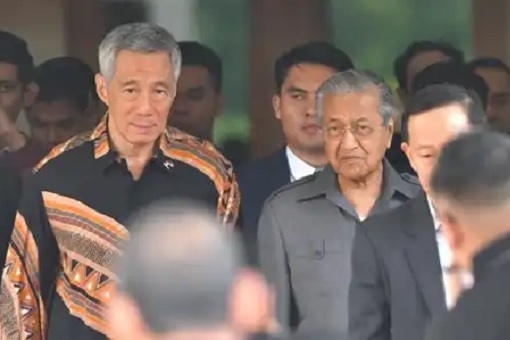
Perhaps what irritated Lee the most was the suggestion by the website founder, Alex Tax, that the PM and the republic may be sanctioned internationally – if found guilty of committing the hanky-panky business deals. And PM Lee definitely “loses face” when Alex wrote that the Singapore government was immediately summoned for questioning in Kuala Lumpur after a new Malaysian government was formed.
Reproduced across the causeway by “The Coverage”, the High Commission of the Republic of Singapore in Malaysia slammed the news article as fake newsand clearly libellous. Strangely, the Monetary Authority of Singapore was the one – not Lee Hsien Loong – who filed a report with the Singapore Police Force against the author, claiming the article to be fake and malicious.
Author Alex Tan was actually a member of the Singapore People’s Party who stood in the 2011 General Election in the Ang Mo Kio Group Representation Constituency under the Reform Party banner. He has been living in Sydney, Australia, since March 2015. Refused to take down the article as instructed, Alex instead invited PM Lee to file a case with the Australian authorities.
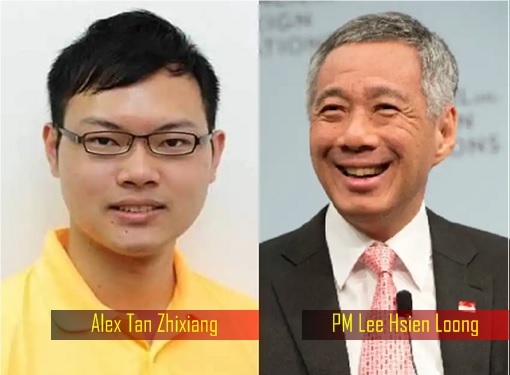
Like what disgraced ex-PM Najib Razak had done to websites critical of him when he was in power previously, the Singapore IMDA (Infocomm Media Development Authority) eventually flexed its muscle – blocking access to the States Times Review website. And like the Najib regime, Lee government quickly took advantage of the issue and proposed anti-fake news laws.
Calling it the dictatorship’s favourite legal weapon, Alex Tan said Singapore’s Law Minister K Shanmugam threat of using “criminal defamation” was clearly an intimidation to silence and suppress critics. Criminal defamation carries a 2-year jail term and a fine in Singapore. Instead of refuting the allegations like a true democratic leader, PM Lee chose to abuse all the heavy machineries behind him.
As proven in Malaysia, using anti-aircraft guns to shoot a mosquito is absolutely a dumb move. It would eventually backfire, giving a perception that PM Lee Hsien Loong – often ridiculed on social media as “Mr. Pinky” – has everything to hide. He should calmly debunk allegations published, not shutting and threatening every single critic, as if Singapore is a communist country.
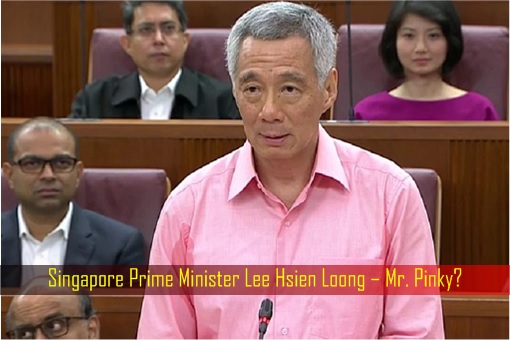
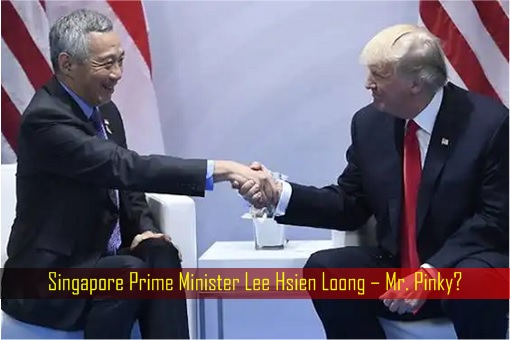
But can the Singapore government convincingly prove that the Singapore-Malaysia High Speed Rail was a fair deal? Most of the HSR line – 335 km of it – will be in Malaysia, with the remaining 15 km in Singapore. Yet, when the Mahathir government wanted to cancel the mega project, Malaysia was told the compensation would be as much as RM500 million.
Does that mean if Singapore were to cancel the project, they have to pay proportionately RM11 billion in compensation to Malaysia? It’s a common knowledge that Lee Hsien Loong was Najib Razak’s durian buddy. Therefore, it’s only natural for rumours and speculations to spread – even thrive – when lopsided business deals were being inked between PM Lee and PM Najib.
In fact, the rumours has been spreading as early as 2010 that the Singapore has threatened Najib with photographs of murdered Mongolian model Altantuya Shaariibuu with him together, hence the sealing of lopsided deal over the KTMB Tanjung Pagar that saw Najib agreed to give ways to some very valuable strategic national assets which Malaysia owned in Singapore for almost 100 years.
No past Malaysian leaders, except Najib Razak, had agreed to give away large parcels of land in Tanjung Pagar, Bukit Timah, Kranji and Woodlands in exchange for small parcels in Marina South and Ophir-Rochor under the pretext of joint development. That was a staggering 434.26 acres (173.7ha) of land in Singapore owned by KTM but given away generously by Najib.
Did Singapore help Najib in laundering the funds of Malaysian state fund 1MDB, as alleged by Alex Tan? The fact remains that Singapore police only moved in to freeze two Singapore accounts on July 15, 2015 “after” the Wall Street Journal exposed (on July 2, 2015) the money trail involving US$681 million transacted through Tanore Finance, a company in the British Virgin Islands, and Falcon Private Bank in Singapore.
For the next subsequent 6 months since its first action, Singapore government remained silent, until Swiss Attorney-General Michael Lauber’s publicly announced that a criminal investigation into 1MDB had revealed that about US$4 billion appeared to have been misappropriated from Malaysian state companies. Again, it was only “after” the exposure that Singapore was forced to react.
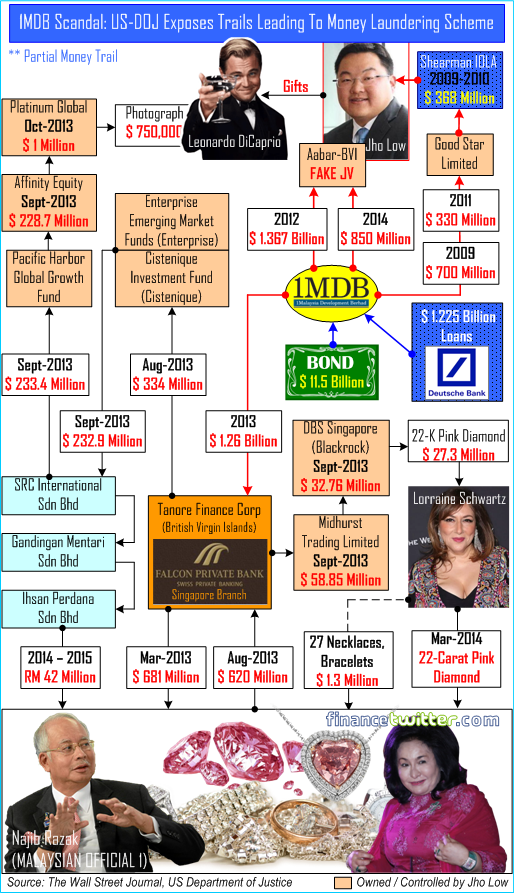
Amusingly, in 2013 alone, the U.S.-Department of Justice’s investigation shows at least US$2.89 billion stolen from 1MDB was laundered through Falcon Private Bank in Singapore. Did the authorities proactively take actions? Nope. But when the scandal finally exposed beyond cover-up, Singapore authorities conveniently claimed that they were aware of “suspicious activities”.
Even then, Singapore had refused to mention Najib Razak’s name in the 1MDB scandal, until Mahathir government finally took the crook to court and slapped him with dozens of charges of criminal breach of trust (CBT), money laundering and abuse of power. Singapore also went bonkers, whining and bitching to Facebook, demanding the tech giant to bring down the so-called fake article.
Perhaps the Singapore government thought they could use the strong-arm tactic to tell Facebook to run their errands, considering the city is home to Facebook’s Asia-Pacific headquarters since 2010. To Lee Hsien Loong’s horror, the Facebook rejected the Singapore request, obviously a humiliating slap in the face of the government who has always gotten its way.
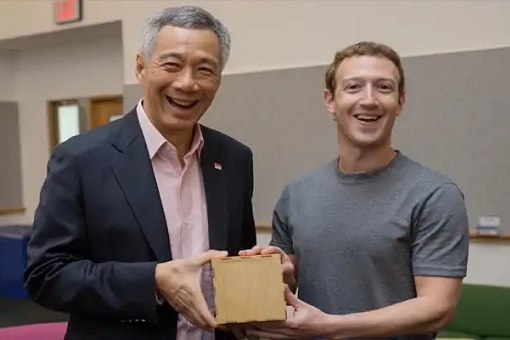
Phil Robertson, Asia’s deputy director of Human Rights Watch, said the Singapore government was engaged in bullying tactics against States Times Review website – “If a story is inaccurate, Singapore should refute it with facts, not shoot the messenger. Actions like these show that when it comes to media freedom, Singapore is no better than repressive regimes like Vietnam or Laos.”
FINANCE TWITTER
✍ Sumber Pautan : ☕ Malaysians Must Know the TRUTH
Kredit kepada pemilik laman asal dan sekira berminat untuk meneruskan bacaan sila klik link atau copy paste ke web server : https://ift.tt/2OCKE1O
(✿◠‿◠)✌ Mukah Pages : Pautan Viral Media Sensasi Tanpa Henti. Memuat-naik beraneka jenis artikel menarik setiap detik tanpa henti dari pelbagai sumber. Selamat membaca dan jangan lupa untuk 👍 Like & 💕 Share di media sosial anda!




















Post a Comment